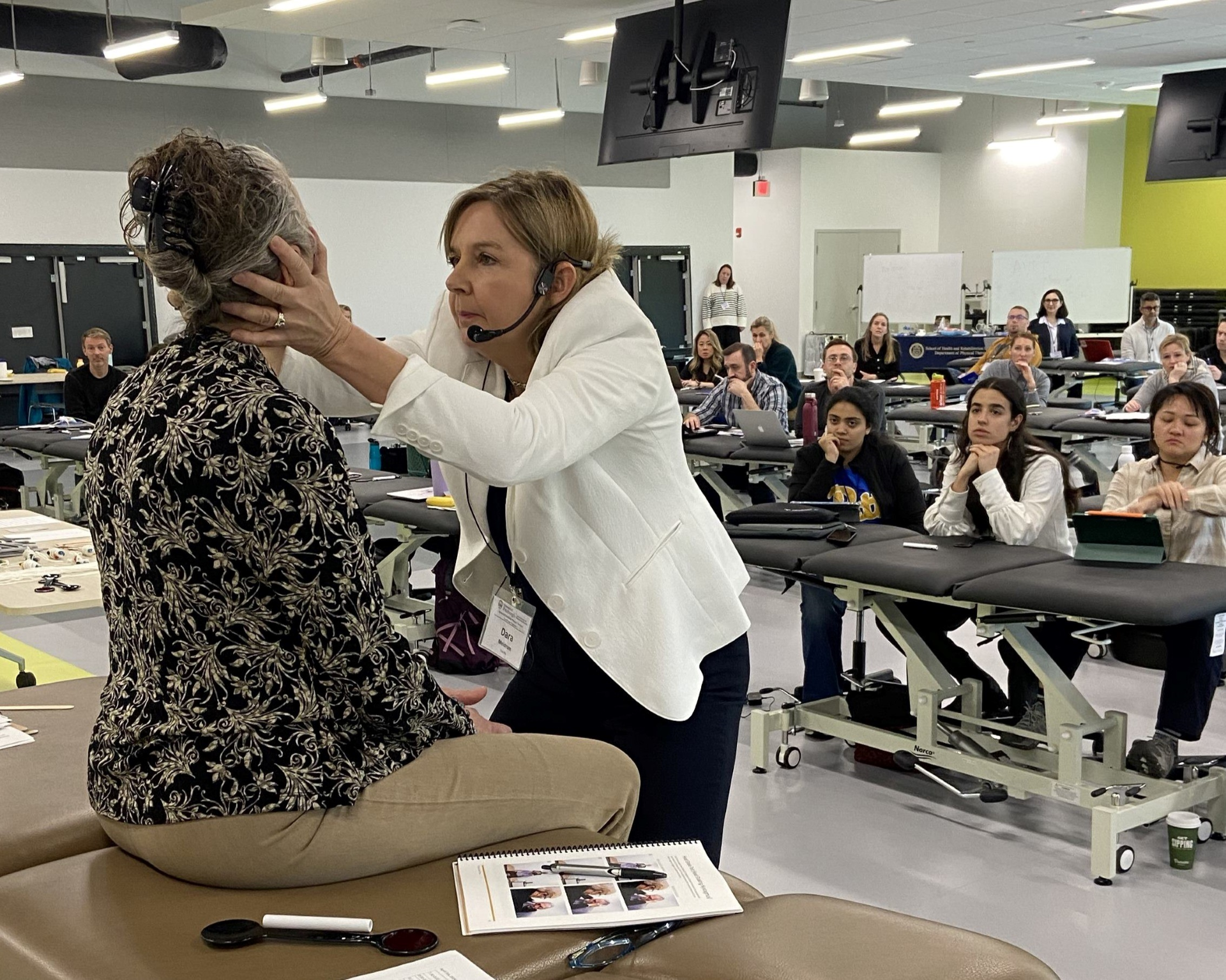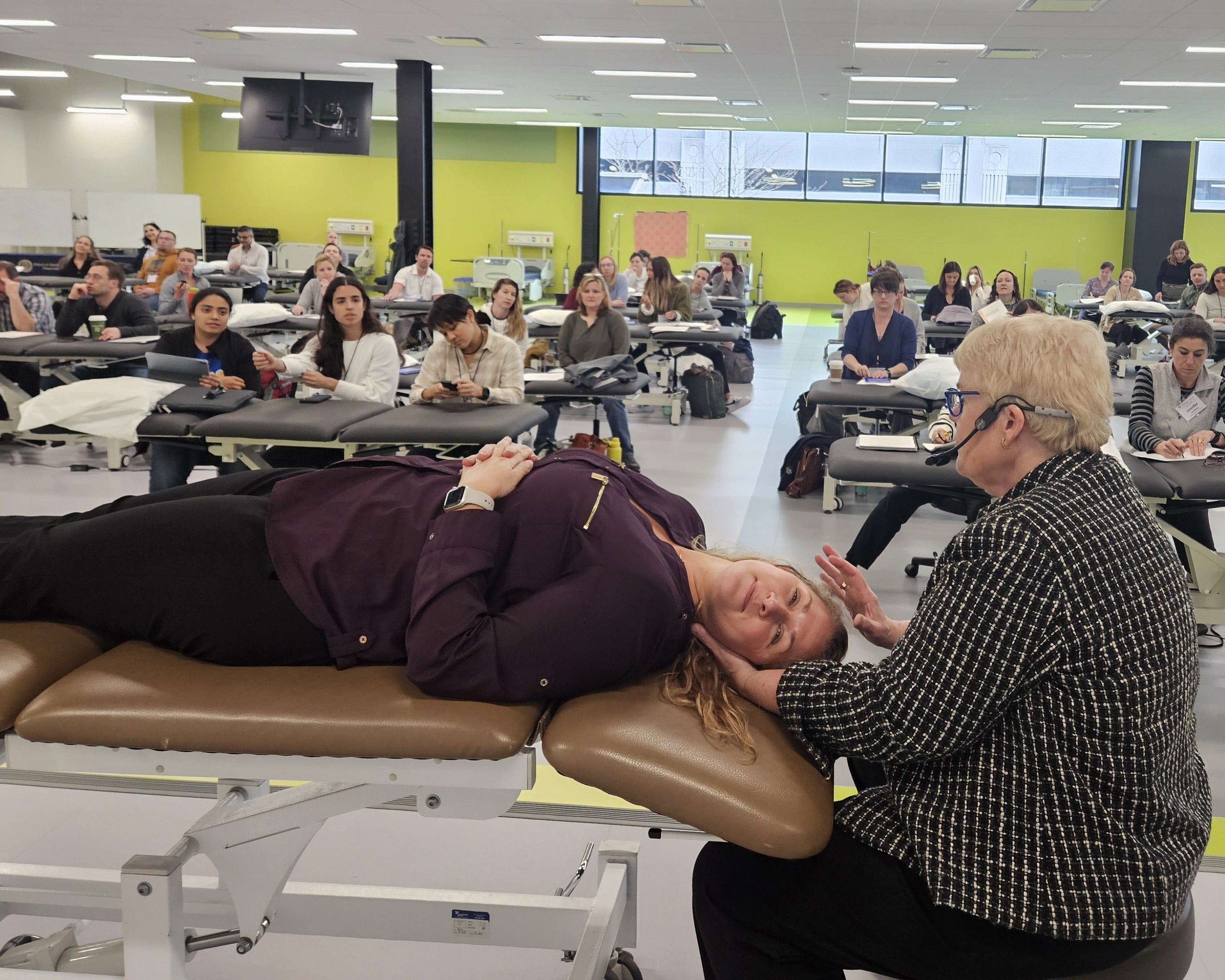Program Overview
The Advanced Vestibular Certificate Program is a comprehensive didactic experience in vestibular physical therapy that prepares and certifies physical therapists to be frontline providers for patients experiencing balance, dizziness and abnormal proprioception.
Many patients start their vestibular episode of care in the emergency room or with a primary care physician and are referred to an otolaryngologist or a neurologist among five-six other medical practitioners before reaching a physical therapist to manage their symptoms. Delays in treatment and unnecessary consultations can result in less function, increased risk of falls and additional complications.
Graduates of the AVPT certificate program will be prepared to manage patients in the primary care setting or part of a team-based model within interdisciplinary settings to maximize clinical outcomes and patient function.
With rising health care costs and delays in treatment associated with managing balance and vestibular disorders, graduates of the AVPT Certificate Program will be well positioned to fulfill this emerging role as a frontline provider in vestibular disorders. Upon certification, participants will be uniquely qualified to achieve the Triple Aim of Healthcare: improved patient health, improved patient experience and decreased per capita costs.
Advanced Vestibular Physical Therapist (AVPT) Certification
The AVPT certification is delivered in a highly innovative format that allows participation from anywhere in the world, but still experience the University of Pittsburgh campus with limited travel. The hybrid format includes self-paced online coursework, synchronous virtual meetings via Zoom and four interactive weekend workshops. The content is delivered in four specific modules and arranged by content. Module 1: Advanced Vestibular Anatomy, VOR function, vestibular testing, outcome measures, differential diagnosis, vestibular perception and acute diagnosis and management. Module 2: Eye movement analysis, concussion, vision, neuropsychology, surgical management, pharmacological management, CNS impairments. Module 3: BPPV, PPPD, pediatric and older adult special considerations and psychological management. Module 4: History taking and interpretation of findings, advanced treatment techniques for physical therapists, exercise dosage, newest interventions, clinical cases, plus the video, practical and written examination.
Each module will consist of 12-16 hours of online presentations, required readings and a virtual journal club via Zoom. Participants will be required to complete the pre-requisite work prior to the weekend workshop. Each weekend workshop will provide 10-12 hours of interactive live presentations delivered through Zoom. At the completion of each weekend workshop, the participants will be required to complete a written examination on the content presented within the module.
Module 4 will require in-person participation on the campus of the University of Pittsburgh for an immersive skills and lab session and competency examination that will include a comprehensive written and practical component of content delivered within all four modules.
Each module can be taken independently, but participants must complete all four modules and successfully pass the competency examination to become certified as an Advanced Vestibular Physical Therapist.

Dates of Weekend Workshops
- Module 1: July 26th-27th, 2025 (Zoom Classroom)
- Module 2: October 11th-12th, 2025 (Zoom Classroom)
- Module 3: January 10th-11th, 2026 (Zoom Classroom)
- Module 4: April 17th-19th, 2026 (University of Pittsburgh, Campus Classroom)
OR
- Module 4: May 22nd-24th, 2026 (Munich, Germany, Campus Classroom)
Times
The typical schedule for the weekend workshops Modules 1-3 will be:
- Saturday Sessions: 8 a.m. - 5 p.m. (EST)
- Sunday Sessions: 8 a.m. - noon (EST)
- In addition, there will be a pre/post module session on the Tuesday evening before and after each weekend session (7-8:30 p.m. EST).
The schedule for Module 4:
- Friday, April 4, 2025: 8 a.m. - 5 p.m. (EST)
- Saturday, April 5, 2025: 8 a.m. - 5 p.m. (EST)
- Sunday, April 6, 2025: 8 a.m. - 12 p.m. (EST)
Agenda and Learning Objectives
Module 1
Module 2
Module 3
Module 4
CEU approval pending from physical therapy state board associations.
*Important note about CEUs: Continuing education requirements vary by discipline, association, and state. It is the responsibility of licensees to follow rules and regulations related to the maintenance of licensure and certifications in their states and organizations. Be sure to visit the requirements of your certification or license if you plan to use this course towards renewal.
If your state or agency requires pre-approval from an accrediting board, you can request the process for obtaining CEU's as an individual participant with that association. Once enrolled in the course you will have access to the most common documents that are required for CEU approval to assist with this process.
Speakers
Click here to learn more about the speakers below.
-
Amy Cassidy, DPT, NCS
-
Adjunct Physical Therapy Faculty School of Health and Rehabilitation Sciences University of Pittsburgh
-
-
Yoon-Hee Cha, MD
-
Associate Professor in the Department of Neurology at the University of Minnesota
-
-
Pam M. Dunlap, DPT, PhD, NCS
-
Assistant Professor in Physical Therapy in the School of Health and Rehabilitation Science at the University of Pittsburgh
-
-
Terry D. Fife, MD
-
Professor of Neurology at the University of Arizona College of Medicine
-
-
Joseph M. Furman, MD, PhD, FAAN
-
Professor in the Departments of Otolaryngology, Neurology, Bioengineering, and Physical Therapy at the University of Pittsburgh
-
-
Colin Grove, DPT, PhD, NCS
-
Postdoctoral Fellow in the Department of Kinesiology at the University of Wisconsin-Madison
-
-
Courtney D. Hall PT, PhD
-
Professor in the Department of Physical Therapy East Tennessee State University
-
-
Regan Harrell, DPT, NCS
-
Assistant Professor in Physical Therapy in the School of Health and Rehabilitation Science at the University of Pittsburgh
-
-
Janet Helminski PT, PhD
-
Professor in Physical Therapy College of Health Sciences Midwestern University
-
-
David Herdman, PT, PhD
-
Principal Physiotherapist for Neurology and Vestibular Outpatients at St George’s University Hospital in London
-
-
Susan J. Herdman PT, PhD
-
Professor Emerita Emory University School of Medicine Department of Physical Medicine and Rehabilitation
-
-
Janene M. Holmberg, PT, DPT, NCS
-
Director Balance Rehabilitation at Intermountain Hearing and Balance Center
-
-
Carrie Hoppes, PT, PhD, NCS, OCS, ATC, CSCS
-
Associate Professor and Director of the Army-Baylor University Doctor of Physical Therapy program
-
-
David Howell, PhD, ATC
-
Associate Professor and Director of Clinical Research at the University of Colorado Anschutz Medical Campus in the Department of Orthopedics
-
-
Klaus Jahn, MD
-
Medical Director of the Schoen Clinic Bad Aibling and head of Neurorehabilitation at the DSGZ (LMU Munich)
-
-
Diego Kaski, MD, PhD
-
Head of the Centre for Behavioural and Vestibular Neurosciences within the Department of Clinical and Motor Neurosciences at the University of Central London
-
-
Jorge C. Kattah, MD
-
Professor in Neurology University of Illinois College of Medicine
-
-
Megan Kenney, OTR/L
-
Adjunct Occupational Therapy Faculty School of Health and Rehabilitation Sciences University of Pittsburgh
-
-
Brooke N. Klatt, PT, DPT, PhD
-
Assistant Professor in Physical Therapy at the University of Pittsburgh
-
-
Vitoria Kochick, PT, DPT, NCS
-
Associate Professor at Slippery Rock University in the Department of Physical Therapy
-
-
Anthony P. Kontos, PhD
-
Professor in the Departments of Orthopaedic Surgery and Sports Medicine and Rehabilitation at the University of Pittsburgh
-
-
Thomas Lempert, MD
-
Professor of Neurology at Charité University Hospital and Head of Neurology at Schlosspark-Klinik
-
-
Julie Maggio, PT, DPT
-
Outpatient Physical Therapist at Massachusetts General Hospital
-
-
Dara Meldrum, PT, PhD, MSc, BSc
-
Associate Professor in the School of Medicine at the Trinity College
-
-
Anne Mucha, DPT, NCS
-
Adjunct Physical Therapy Faculty School of Health and Rehabilitation Sciences University of Pittsburgh
-
-
Marousa Pavlou, PT, PhD
-
Senior Lecturer in Physiotherapy at King's College London
-
-
Michelle R. Petrak, PhD, PhD, CCC-A
-
Director of Clinical Audiology and Vestibular Research for Interacoustics
-
-
Kathryn Schneider, PT, PhD
-
Assistant Professor and Clinician Scientist in the Faculty of Kinesiology at the University of Calgary
-
-
Michael C. Schubert, PT, PhD, FAPTA
-
Professor in the Department of Otolaryngology Head and Neck Surgery and Physical Medicine and Rehabilitation at Johns Hopkins University
-
-
Ryan J. Soose, MD
-
Associate Professor in the Department of Otolaryngology at the University of Pittsburgh
-
-
Patrick J. Sparto, PT, PhD, FAPTA
-
Professor in the Departments of Physical Therapy, Otolaryngology and Bioengineering
-
-
Jeffrey Staab, MD
-
Professor and Chair of the Department of Psychiatry and Psychology at Mayo Clinic
-
-
Vicky Stewart, PT, PhD
-
Physiotherapist at the Gold Coast University Hospital Australia
-
-
Julie Treleaven, PhD, BPhty
-
Lecturer and Senior Researcher at the University of Queensland
-
-
Raymond Van Der Berg, MD
-
Associate Professor at Maastricht University Medical Center
-
-
Lien Van Laer, PT, PhD
-
Faculty of Medicine and Health Science Department of Rehabilitation Science and Physiotherapy at the University of Antwerp
-
-
Susan L. Whitney, DPT, PhD, NCS, ATC, FAPTA
-
Professor in Physical Therapy and Otolaryngology University of Pittsburgh
-
-
Dario Yacovino, MD
-
Professor of Clinical Neurology at the Medical School of Buenos Aires University
-
-
David S. Zee, MD
-
Professor Johns Hopkins University
-
-
Lori Zitelli, Au-D, CH-TM
-
Adjunct Faculty at the University of Pittsburgh in the Audiology Department
-
-
Francisco Carlos Zuma e Maia, MD, PhD
-
Preceptor in Neurotology at Pontifícia Universidade Católica do Rio Grande do Sul
-
Registration Fees
$675 per module
Note: Participants will be required to register for each module separately.
Application Process
Applications are closed for the 2024-2025 cohort. The application for the 2025-2026 cohort will open on February 28th, 2025 at 12 PM EST.
Pre-requisite Experience:
Certification is limited to licensed physical therapists.
Participants best suited for this experience are:
- Licensed in good standing in country of origin. Will need to provide copy of license as proof.
- Minimum of two years of post-professional vestibular rehabilitation clinical experience
Favorable consideration will be given to applicants with at least one of the following:
- Graduate of an APTA accredited residency program
- A certified ABPTS specialist
All candidates are required to submit a Cover Letter and Curriculum Vitae demonstrating credentials and qualifications that meet or exceed the above admission requirements. The enclosed cover letter should indicate the participant’s expectations of the program, desired learning objectives and opportunities for implementing new concepts into clinical practice.
If a candidate does not meet the prerequisite admission requirements, s/he can submit evidence of the equivalent of the above criteria subject for approval by our AVPT Advisory Panel through an individual review process. Submit your request and justification with your cover letter in the application linked below. A phone interview may be required.
Cancellation Policy
For cancellations sent before the first of the month preceding the AVPT weekend, tuition will be refunded minus a $75.00 administrative fee. Cancellations sent after the 1st of the month, but before the 31st of the month preceding the registered weekend, tuition will be refunded minus a $125.00 administrative fee. No tuition will be refunded for requests sent after the 31st of the month preceding the weekend workshop.
Contact Us
Contact the AVPT team at advancedvestibularPT@pitt.edu with any questions related to the program.
Follow us on Facebook for updates!

